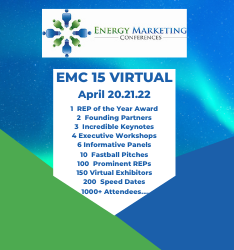|
|
|
|
|
Following PSC Guidance, Staff Provides Consensus Items For Supplier Consolidated Billing Regulations; Some Issues Remain Unresolved
The following story is brought free of charge to readers by EC Infosystems, the exclusive EDI provider of EnergyChoiceMatters.com
Staff of the Maryland PSC have updated proposed regulations for supplier consolidated billing (SCB) following direction from the Commission during a December rulemaking session for additional discussion among stakeholders on various non-consensus issues (RM70)
A further rulemaking session will be held starting Feb. 22
Among the notable guidance provided by the PSC during the December rulemaking is that a supplier's consolidated bill does not have to unbundle their bundled charges on the bill. However, in a non-consensus item, the Staff draft still proposes that a supplier be required to disclose in the customer’s contract the percentage of a bundled charge that will be treated as commodity for payment posting.
Per PSC guidance, Suppliers using SCB will have to include the utility customer service phone number on the supplier's consolidated bill
Staff said that a tentative consensus has been reached on certain issues, though there remain some issues on which consensus has not been reached
Issues on which tentative consensus has been reached include the following:
Supplier Call Center Agents
Supplier call center agents will provide utility customer service and emergency contact number.
Additionally, the PSC previously said in guidance that, for call center reporting metrics, the supplier does not need to report at the Maryland level.
Bill Adjustments
Staff originally proposed that the utility would send a single bill for all previous supplier consolidated bills within a bill adjustment, but this was opposed by a number of parties. The Commission requested that parties discuss to determine if Staff’s method could be implemented.
Through discussions it was determined the utilities would have to spend a significant amount of capital to implement Staff’s proposal (~$4.4 million for PE and ~$14 million for the Joint Exelon utilities).
Due to the high costs of Staff's proposal, Staff is willing to support the utility position that previous bill providers send former customers the bill for a bill adjustment so long as data is saved related to bill adjustments and this topic is revisited during a Phase II of the rulemaking for SCB when the treatment of energy assistance customers for purposes of SCB is finalized.
Commissioner O’Donnell requested that the work group determine what financial recourse a supplier would have if a bill adjustment is greater than 3 years and is the fault of the utility. After discussing, the work group determined that a supplier in this situation would be unable to recover the costs of this bill adjustment. Staff represented that suppliers in the work group indicated that this is a cost of providing supplier consolidated billing
Change in customer’s billing method allowed by contract
The Commission requested that Staff, OPC, and Petitioners (suppliers) develop a compromise on when a supplier may change a customer's billing method
A compromise was reached for contracts which explicitly allow a change in the customer's billing method. Under the compromise, customers whose contracts allow for a change in billing method will receive a notice by mail, will be provided additional customer education material, and early termination fees are waived for the first two billing cycles after a change in billing method.
The requirement for and treatment of a change in billing method for contracts that are silent with respect to such change remain an unresolved issue
Supplier ineligible to provide SCB due to late or missing POR payments.
If a supplier is more than 30 days late in a POR payment to the utility, then the supplier becomes ineligible to provide SCB. The supplier may provide the customer a dual bill for supply charges.
Energy Assistance Eligibility
The Commission previously provided guidance that customers on energy assistance should not participate in SCB until a Phase II is complete.
The proposed list of criteria utilities plan to use to determine if a customer is on energy assistance include:
• The customer has MEAP or EUSP funds currently on their utility account;
• The customer was certified for MEAP or EUSP benefits in the last 12-month period;
• An active 55-day hold has been placed on the account by OHEP;
• 30-day medical hold placed on account by OHEP or other entity for the critical medical needs program;
• The customer is enrolled in USPP; and/or
• The customer is enrolled in EUSP Budget Billing.
Customer who starts to receive energy assistance while on SCB
The Commission provided guidance that customers on energy assistance should not participate in SCB until a Phase II is complete. The Working Group developed a process whereby a supplier will have 3 business days to change a customer’s billing method if the customer starts to receive energy assistance while on SCB.
More specifically, under the latest proposal, if a customer with a SCB supplier starts to receive energy assistance funds then the utility will send supplier a 3 business day notice. The supplier has 3 business days to change the customer's billing method away from SCB. If a new contract is not established then the customer will be dropped to SOS. The proposal would waive the notice requirement to notify a customer of a change in bill method for these scenarios, e.g. supplier can automatically move customer to UCB. If another supplier enrolls a customer during the 3 days, the customer is enrolled with the new supplier.
Bill Forms
Regulations were revised to implement Commission guidance. Parties agreed to the provision of additional information on the bill. As noted, per PSC guidance, the supplier must include the utility customer service phone number. The staff proposal also includes a request from Potomac Edison that the bill includes the utility service address. As noted, suppliers do not have to unbundle their bundled charges on the bill. – Commission Guidance
Reporting Requirements:
Additional reporting requirements have been added to the SCB reporting section of COMAR. Additionally, OPC will be able to request that suppliers provide this information and the information will be saved in a disaggregated form by the utility.
Issues for which a consensus was not reached include the following:
Defining Commodity in regulations
Staff has not included a definition of commodity in regulations. "Commodity" costs must be defined due to delineation of commodity versus non-commodity costs under proposed SCB partial payment regulations
Treatment of bundled products in contract
Suppliers oppose stating on the customer’s contract the percentage of the charge that will be treated as commodity for payment posting.
The proposed regulations require a supplier to disclose in the customer’s contract the percentage of a bundled charge that will be treated as commodity for payment posting.
50/50 payment posting application when gas and electric service are on the same bill and there is partial payment
The Commission provided guidance that if a bill has both electric and gas charges, on it a partial payment would be split 50/50 between the electric and gas charges. The Commission requested parties to include language indicating that if one commodity was left unpaid and funds remained, then the other commodity would be paid. Parties have interpreted this guidance differently: (1) split payment in half but pay all utility arrears (gas and electric) before paying supplier arrears or (2) split payment in half and pay each commodity grouping separately before considering the other charges (e.g. all gas charges are paid (supplier and utility) without considering whether
electric utility charges are paid off). Option (2) is proposed in the regulations as filed.
Changing a customer’s bill method if contract is silent
The Commission requested that Staff, OPC, and Petitioners develop a compromise on this issue, but a compromise was not reached. OPC still favors a scenario where if a contract is silent regarding a supplier’s ability to change a customer’s billing method, then the supplier must obtain the customer’s consent. The Petitioners were not amenable to OPC’s proposal.
As proposed, the regulations still allow a supplier to change a customer’s billing method if the contract is silent on the issue, but the supplier is not allowed to assess a fee or penalty if the customer chooses at a later date to exit the contract.
Budget Billing at Time of Switch
If a budget bill true up at time of switch exceeds $100, the regulations obligate the utility to immediately split the true up over three bills that are directly billed by the utility.
Some parties oppose this and believe this should not be an automatic transaction. Instead they request that the customer true-up be billed all at once after which the customer must be given a payment arrangement of at least three months if requested.
Utility ability to provide a budget bill
Regulations have been worded such that a utility may provide a supplier a budget bill for distribution charges.
A number of parties continue to oppose this and believe the utility should not be permitted to provide the customer a budget bill for utility charges while the customer is with a supplier. Under this scenario, only the supplier will provide a budget bill for utility charges.
Supplier use of customer deposit
Proposed regulations do not obligate a supplier to apply a deposit held by a supplier to utility charges because the utility is permitted to hold a deposit for distribution charges while the customer is with the supplier. Additionally, there are no standard business requirements for when a supplier may use a customer’s deposit.
One utility currently believes the supplier should be required to apply the deposit held to utility charges before returning utility arrears to the utility.
Customer Ineligibility notices
Since the Commission ruled that a customer can be considered ineligible for SCB, Staff proposed that it be mandatory that a customer receive a notice of ineligibility from a supplier.
Some suppliers want to continue to follow today's current business practice that a supplier is not obligated to inform a customer if the enrollment with a supplier fails.
Other unresolved topics include: call center metrics, whether evergreen contracts should be sent separately from the bill, confidentiality of supplier applications, and caps on late fees.
Staff also provided updates on certain specific requests from Commissioners.
Commissioner Linton requested regulations that indicate a customer should contact a supplier with questions prior to the utility. After considering this request, Staff recommends that this concept be included in the Customer Education Material, such as the customer rights pamphlet rather than in regulation. If a utility receives a call from an SCB customer that requires utility attention, it would be appropriate for the utility to assist at that time. Staff is concerned that such a regulation could have the inadvertent effect of causing the utility to send a customer to a supplier for utility questions.
ADVERTISEMENT Copyright 2010-21 Energy Choice Matters. If you wish to share this story, please
email or post the website link; unauthorized copying, retransmission, or republication
prohibited.
February 15, 2021
Email This Story
Copyright 2010-21 EnergyChoiceMatters.com
Reporting by Paul Ring • ring@energychoicematters.com
NEW Jobs on RetailEnergyJobs.com:
• NEW! -- Commercial Sales Support Representative -- Retail Supplier
• NEW! -- Channel Partner/Channel Sales Manager -- Houston
• NEW! -- Wholesale Originator -- Retail Supplier -- Houston
• NEW! -- Trading Analyst -- Retail Supplier
• NEW! -- Renewables Trader -- Retail Supplier
• NEW! -- Channel Partner Sales Manager -- Retail Supplier
• NEW! -- Experienced Retail Energy Account Manager
• NEW! -- Sales Channel Manager -- Retail Supplier
• NEW! -- Retail Energy Account Executive -- Texas
• Supply and Pricing Analyst -- Retail Supplier -- DFW
• IT Billing Project Manager
• IT Billing Business Analyst
|
|
|
|










